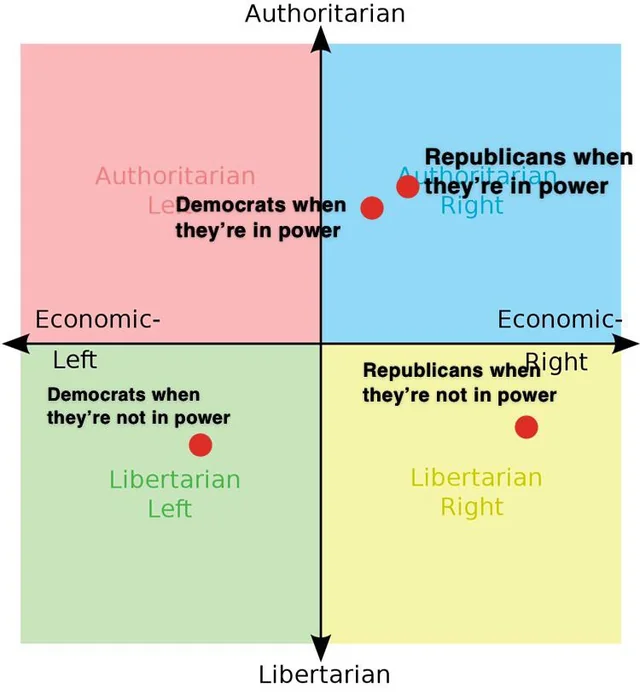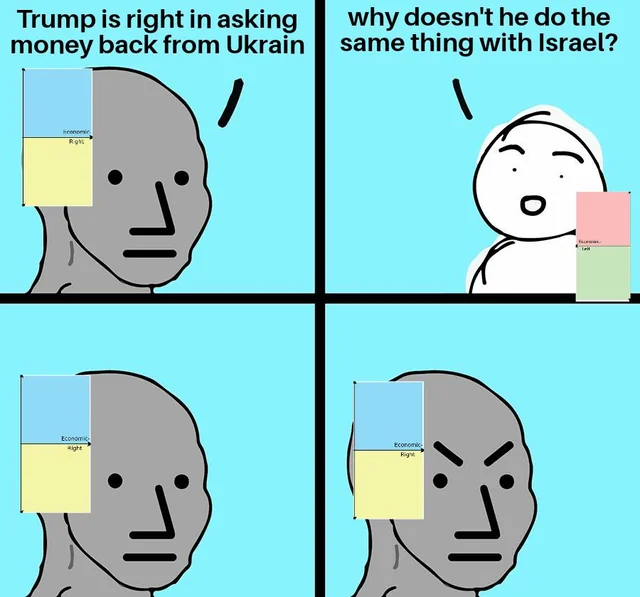What Is the Political Compass Meme?
The Big Idea in 30 Seconds
- It's a graph: The political compass is a grid with four main zones. It helps show how different political beliefs relate to each other.
- Two axes, not one: It adds a second axis (freedom vs control) to the usual left vs right, making room for more nuance.
- A popular meme format: The chart became an internet meme. People use it to make jokes about politics, often with cartoons or characters in each corner.
- Serious idea, funny execution: While the meme is playful, it’s based on real political ideas and continues to be a useful tool in understanding beliefs.

So, What Is the Political Compass?
Most people think of politics as one big line: left vs. right. But that line often leaves out one major thing: how much control or freedom a person believes the government should have over our lives.
That's where the political compass comes in. It maps beliefs on two axes, not just one:
- Economic Left ↔ Economic Right: Do you want government control of the economy (like higher taxes and social programs), or do you want the free market to take care of things?
- Authoritarian ↑ ↔ Libertarian ↓: Do you think the government should enforce strict rules, or should people be free to live however they want?
Now picture this like a square with four corners. Each corner shows a different mix of ideas:
- Top-Left (Authoritarian Left): Government control in both economy and personal life. Think of older-style communism.
- Top-Right (Authoritarian Right): Strict rules and free markets. Picture a military-heavy, capitalist state.
- Bottom-Left (Libertarian Left): Economic equality and personal freedom. Like progressives who care about civil rights and helping the poor.
- Bottom-Right (Libertarian Right): Free markets and minimal rules. Think of people who want low taxes and also want drugs legalized.
The Meme-ification of a Graph
At some point in the early 2000s, this serious diagram started showing up online in funny ways. Instead of policy ideas, people filled the four corners with everything from characters in movies to types of bread. That’s how the political compass meme was born.

One of the reasons it works so well as a meme is that it captures both seriousness and absurdity. Want to place characters from “The Office” on a political grid? Sure. Want to place different types of pizza toppings? Why not. That flexibility keeps the meme fun—but its deep roots still matter.
Why It Still Matters
The funny version of the compass is viral, but the real thing is still useful. It helps us understand that politics isn't just about choosing "left or right." People care about freedom, tradition, safety, fairness, and equality—in different ways.
Jonathan Haidt explores this deeper in The Righteous Mind, where he explains how moral values shape our political choices—often without us realizing it.
Another way the compass helps is showing how people can be politically active in very different ways. In Politics Is for Power, Eitan Hersh talks about moving beyond online posts and memes to real-world action. Being aware of where you land on the political compass can help you figure out what issues matter most to you—and where you should put your effort.
But Don’t Take It Too Seriously
Not all political scientists love the compass. Some say its labels are too vague or that it oversimplifies complex beliefs. And of course, it can't capture every viewpoint.
Still, for a tool that helps start conversations, jokes, and debates—it does its job. And in times when democracies are under pressure, as discussed in How Democracies Die, getting people to reflect on their values is no small thing.
Final Thoughts
The political compass meme is more than just internet humor. It’s a simplified map of a very messy landscape. While it won’t capture everything about your beliefs, it will make you stop and think—which corner am I closest to? And why?
Whether you're laughing at memes or rethinking where you stand, it's a reminder: politics isn't just left or right—it's also up, down, inside, and out.
Find your place on the spectrum.
Now that you understand the meme, find out where you actually land on the compass.
Take the Free Political Test The Global Shift Network
The Global Shift Network